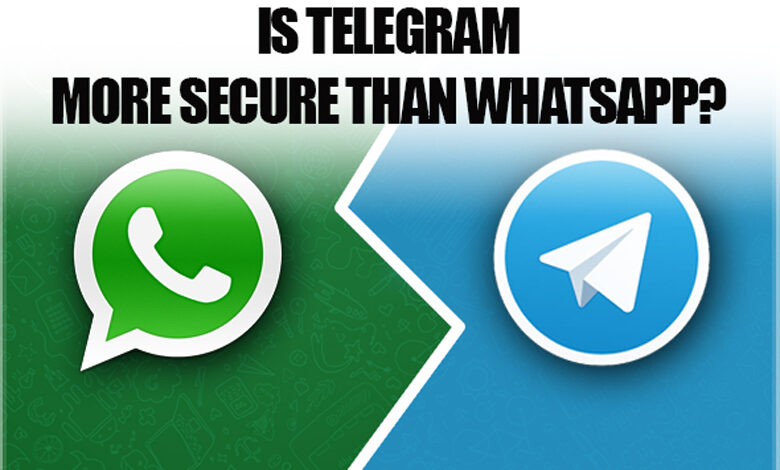Is Telegram more secure than WhatsApp?

In recent years, instant messaging apps have become integral to our daily lives. With their widespread use, concerns about the security and privacy of our messages have grown.
Two of the most popular messaging apps, Telegram and WhatsApp, have been in the spotlight for their security features.
The question arises, “Is Telegram more secure than WhatsApp.”
While both apps claim to have end-to-end encryption and offer features to protect user privacy, there are significant differences in their security protocols.
This article will examine and compare the security features of Telegram and WhatsApp to determine which app is more secure for messaging.

Telegram’s Security Features
Telegram offers a range of security features to protect users’ privacy and messaging security, including:
· Secret Chats
End-to-end encryption is used for messages sent via Secret Chats, and users can set messages to be automatically deleted after a set time.
Related :
• How can I see hidden messages on WhatsApp?
• Settings on WhatsApp That Must be Modified for 2023;
· Two-factor authentication
Telegram allows users to use 2FA, which requires a second factor, such as a code or biometric verification, and the user’s password to log in to their account.
· Cloud-based platform
Telegram’s platform is cloud-based, meaning users’ messages and media are stored remotely rather than on their devices.
This allows for remote device logouts, which can help prevent unauthorized access to users’ accounts.
· Blocking screenshots
Telegram allows users to block screenshots from being taken of their Secret Chats, adding a layer of security to their messaging.
· No backup encryption
Telegram does not offer end-to-end encryption for cloud backups, meaning third parties could potentially access users’ messages and media if their cloud storage is compromised.
WhatsApp’s Security Features
Another messaging service that provides a variety of security safeguards to safeguard users’ privacy and messaging security is WhatsApp.
These features include:
· End-to-end encryption
WhatsApp’s messages are protected by end-to-end encryption, which means that only the sender and recipient of a message can access its contents.
· Two-step verification
WhatsApp offers a two-step verification process, requiring users to enter a PIN code and phone number to log in to their accounts.
· Backup encryption
WhatsApp provides end-to-end encryption for backups stored in the cloud, meaning users’ messages and media are protected even if their cloud storage is compromised.
· Fingerprint and face recognition
One of the main features of WhatsApp that makes it more competitive against Telegram is Fingerprint and face recognition.
WhatsApp allows users to set up fingerprint or face recognition to lock the app, adding an extra layer of security to prevent unauthorized access.
· Suspicious link detection
Another significant feature is that WhatsApp can detect suspicious links and alert users before they click on them, potentially preventing users from falling victim to phishing or malware attacks.

Comparison of Telegram & WhatsApp’s Security Protocols
Regarding messaging security, Telegram and WhatsApp have different approaches to protecting user privacy.
While both apps offer end-to-end encryption and two-factor authentication, their security protocols differ.
1. One key difference is the way the apps handle backups.
Telegram does not offer end-to-end encryption for cloud backups, meaning third parties could access users’ messages and media if their cloud storage is compromised.
On the other hand, WhatsApp provides end-to-end encryption for backups stored in the cloud, providing an extra layer of protection for users’ data.
2. Another difference is the apps’ policies on metadata.
Telegram’s metadata, such as message timestamps and IP addresses, is not encrypted, while WhatsApp encrypts all metadata associated with messages.
This means that WhatsApp users may have more comprehensive protection of their message metadata than Telegram users.
3. Telegram’s Secret Chats feature offers advanced security options.
For example, block screenshots and self-destructing messages unavailable in WhatsApp.
To summarize
Telegram and WhatsApp have security features designed to protect users’ privacy and messaging security.
While Telegram offers advanced security features such as Secret Chats and remote device logouts, WhatsApp provides robust end-to-end backup encryption and encrypts all message metadata.
Ultimately, the answer to the “is Telegram more secure than WhatsApp” question depends on individual user preferences and needs.
Therefore, it is difficult to say which app is more secure than the other definitively. It comes down to what features and level of security each user prioritizes and feels comfortable with.




